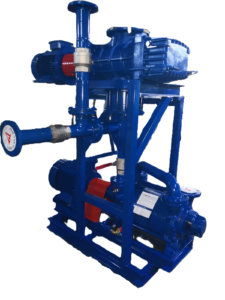Deep Vacuum Systems: Technical Overview and Areas of Application
Introduction
Deep vacuum systems are specially designed to achieve high vacuum levels. These systems are widely used in industrial and scientific applications that require ultra-low pressure. Offering high precision, reliability, and efficiency, deep vacuum systems deliver optimal performance by combining different pump types and technologies. In this article, the working principle, structural features, advantages, and areas of use of deep vacuum systems will be discussed.

vacuum booster with vacuum system
- Working Principle of Deep Vacuum Systems
Deep vacuum systems operate through a combination of various vacuum pumps. Commonly used pump types include:
- Oil-Sealed or Dry Rotary Vane Pumps: Used to create the initial (rough) vacuum.
- Diffusion Pumps: Provide vacuum at the molecular level, operating at high speed.
- Cryogenic Pumps: Create vacuum by condensing gases at extremely low temperatures.
- Turbomolecular Pumps: Use high-speed rotors to evacuate molecules and achieve deep vacuum.
These pumps work in tandem, complementing each other to reach ultra-low pressure levels.
- Structural Features
Deep vacuum systems consist of the following components:
- Vacuum Pumps: Incorporate multiple types of pumps to reach the required pressure level.
- Vacuum Chambers: Sealed enclosures used in testing and production processes.
- Vacuum Measurement Systems: Include digital or analog sensors for precise pressure control.
- Filters and Sealing Components: Ensure safe and efficient operation of the system.
- Cooling Systems: Prevent overheating of both the pumps and the vacuum chamber.
- Advantages
The main advantages of deep vacuum systems include:
- Ultra-Low Pressure Levels: Can generate vacuum levels down to the nanopascal (nPa) range.
- Precise and Controlled Operation: Ensures high accuracy in scientific and industrial processes.
- Wide Range of Applications: Suitable for many sectors, from research laboratories to industrial manufacturing.
- Energy Efficiency: Consumes less energy thanks to advanced engineering solutions.
- Durability and Long Lifespan: Built with high-quality materials for long-term use.
- Areas of Application
Deep vacuum systems are critically important across various industries:
- Semiconductor Manufacturing: Used in the production of chips and electronic components.
- Aerospace Industry: Simulates outer space conditions for satellite and spacecraft testing.
- Nuclear Research: Required in particle accelerators and fusion research.
- Medical and Biotechnology Sectors: Used in precision lab tests and sterilization processes.
- Coating Technologies: Enables vacuum deposition for coating optical lenses, solar panels, and sensitive surfaces.
Conclusion
Deep vacuum systems play a vital role in both industrial and research applications thanks to their ability to achieve ultra-low pressure levels. With precise and reliable vacuum technology, they deliver high performance in numerous advanced technology processes. By selecting a system that matches your required vacuum level, you can optimize your operations for maximum efficiency

